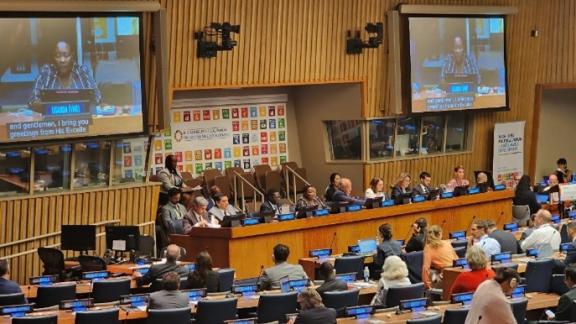In July 2024, international communities, media, CSOs and the government convened in New York City for the High Level Political Forum (HLPF),[1] from 8th July to 18th July 2024.
The HLPF serves as the central platform for follow-up and review of the 2030 Agenda for Sustainable Development and the Sustainable Development Goals (SDGs).
This year’s theme was "Reinforcing the 2030 Agenda and eradicating poverty in times of multiple crises: The effective delivery of sustainable, resilient and innovative solutions.”
The 2024 HLPF reviewed 5 SDGs in depth; Goal 1, Goal 2, Goal 13, Goal 16 and Goal 17. In addition to the sessions on the goals, the HLPF had sessions on Voluntary National Reviews (VNR) from 38 member states on their implementation of the 2030 Agenda, Uganda inclusive.
Sophie Nampwewo, the Acting Governance and Accountability Manager shares her reflections from the meeting:
I took part in this year’s HLPF where I attended various meetings including the General Debate under the theme: “From the SDG Summit to the Summit of the Future.”
This allowed Ministers and high-level representatives of participating states, as well as International Non-Governmental Organisations (INGOs), the UN system, and major groups and other stakeholders, to exchange experiences, lessons learned, policy guidance, transformative actions and initiatives for following up to the Political Declaration of the 2023 SDG Summit and accelerating the implementation of the 2030 Agenda, contribute to the preparations of the Summit of the Future, to be held in September 2024.
During the general debate, the Rt. Hon. Prime Minister of Uganda made a presentation and emphasised the need for the international community to re– commit its support to humanitarian assistance in Uganda to cater for the ever-increasing influx of refugees in the country and continuous humanitarian situations caused by climate change.
Uganda also participated in its Third Voluntary National Review (VNR) where the Rt. Hon. Prime Minister of the Republic of Uganda indicated that the country had only 26.1% targets of SDGs on track, with 54.2% having limited progress and 19.7% stagnating.
Uganda has however made substantial investments in key areas of infrastructure and human capital development, which have significantly enhanced the country's competitiveness and present numerous viable financing opportunities.
Moving forward, Uganda will focus on; identifying and exploring options for creating synergies among the various SDGs to leverage available resources and capacities; leveraging innovations in technology and digitalization; fostering partnerships and international cooperation, especially regional and South-South Triangular Cooperation; building resilience of the economy to various shocks including climate change; and strengthening institutional and human capacity for effective service delivery. Documents for Uganda review can be accessed here and the full report.
I also attended a discussion on Critical Energy Transition Minerals to accelerate progress towards the SDGs by the Regional Commission New York Office. This session focused more on critical minerals and their contribution to sustainable development, emphasising resource efficiency and minimizing emissions footprint, with innovative financing strategies, resource mapping, and policy framework for fairness, flexibility and future.
There is a strong linkage between transitional minerals and the SDGs, with the need to protect and respect communities’ rights as minerals are being explored. The need to explore regional evaluations and how they can be overcome while addressing corruption through SDG 16 and not jeopardizing crucial environment and human hazards, was emphasized.
Investment in minerals is done by rich companies and there is an imbalance in negotiating. No fair price and investment. Some of the key takeaways in this session were:
- Value addition should happen at the source and also apply to all sections of the value chain
- Domestic countries should enjoy and benefit most from the minerals in their countries and benefit from them and their development
- The principle of economic equity should be emphasized, calling for a new vision of governments and companies without basing on power and influence
- Companies should not sin tax exemptions to benefit the countries that own the minerals for their development
- Development partners should provide concessional financing to support the value addition to the respective countries, with a condition of feasibility studies undertaken.
- Strengthen accountability measures and support downstream actors for value addition
- Increase capacity building and coordination mechanisms in negotiations for the critical and transitional minerals
- Have clear requirements to the observation of Human Rights following the World Bank Environment and Social Governance Policies Criteria, and respective country policies for mining
The HLPF was a great opportunity for Oxfam International and specifically Oxfam in Uganda to engage especially when Uganda was being assessed, as our work directly feeds into the SDGs, with opportunities to engage and influence with different development stakeholders including Government, private sector and development partners. Oxfam in Uganda can also strategically position itself and take part in the upcoming Summit of the Future in September which kickstarts the journey towards a way forward after the SDGs.

Hon. Nabanja presents Uganda’s report during High Level Political Forum (HLPF) in New York
